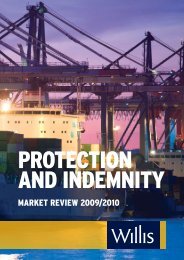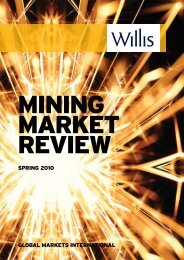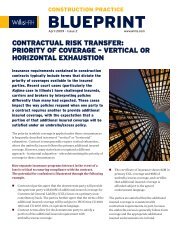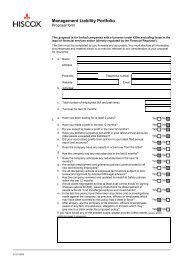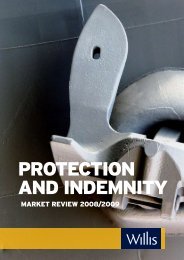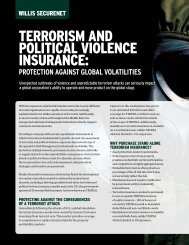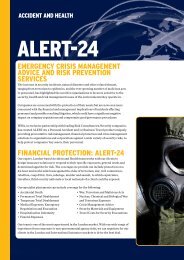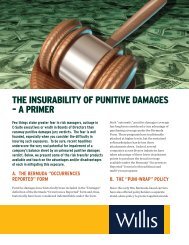spRING 2011 GlobAl MARKETs INTERNATIoNAl - Willis
spRING 2011 GlobAl MARKETs INTERNATIoNAl - Willis
spRING 2011 GlobAl MARKETs INTERNATIoNAl - Willis
You also want an ePaper? Increase the reach of your titles
YUMPU automatically turns print PDFs into web optimized ePapers that Google loves.
iNteRNatioNal FoRCes<br />
The origin of most international standards<br />
and expectations for environmental and social<br />
performance in the Mining sector is the E.U.,<br />
North America and Australia. This doesn’t<br />
mean that ‘west is best’ – both east and west<br />
do some things well and we need to learn and<br />
adopt good practice from both.<br />
Perhaps the most influential force for<br />
improving sustainable practices at the moment<br />
is the Equator Principles (EPs). Many financial<br />
institutions are signatories to the EPs and the<br />
requirement for projects to be compliant is<br />
being driven by them.<br />
The Equator Principles require adherence to<br />
the World Bank/IFC Performance Standards.<br />
The World Bank has been a major driver<br />
in developing consistent and practical<br />
environmental and social performance<br />
standards across a range of industry sectors,<br />
especially in developing countries, but with<br />
many lessons for transitional and recently<br />
independent economies.<br />
The European Union has developed and<br />
issued a number of Directives which, whilst<br />
binding only on member states, have served<br />
as models for many countries that are<br />
developing their own regulatory systems.<br />
Those of particular relevance for mining<br />
include Directives covering EIA (project and<br />
strategic assessment), water resources and the<br />
management of Mine Wastes.<br />
These are not separate stand-alone systems; they<br />
have evolved together through international<br />
collaboration and are largely consistent.<br />
FiNaNCial iNstitutioNs aNd leNdeRs<br />
As mentioned above, many financial institutions – principally<br />
commercial banks – are signatories to the Equator Principles, which<br />
commit them to ensuring that the projects to which to lend are<br />
compliant with certain environmental and social standards. As well<br />
as Environmental and Social Impact Assessment requirements,<br />
the Equator Principles require the implementation and continuing<br />
commitment to the environmental and social management plans,<br />
as a condition of any loan. In other words, the post-permitting<br />
implementation is audited and checked, ensuring follow through from<br />
assessment during permitting and financing, to management plans<br />
during operation.<br />
In addition, equity markets are also influencing sustainability in many<br />
industrial sectors. Natural resource company listings on international<br />
stock exchanges, particularly London, include requirements for<br />
reporting on a company’s health and safety record, environmental<br />
performance and social community relations as part of the Competent<br />
Persons Report (Mineral Experts Report) published in the prospectus.<br />
Other measures such as Sustainability indices and reporting will<br />
become increasingly important in maintaining shareholder interest.<br />
Why should CoMPaNies CaRe aBout sustaiNaBility aNd<br />
tRaNsPaReNCy?<br />
There are three main reasons why sustainability and transparency are<br />
important to a company:<br />
1. Reputation and image:<br />
• Share price and investor concerns;<br />
• Ability to raise capital;<br />
• Ability to gain permits and licences.<br />
2. Access to finance:<br />
• Access to loan finance and gap finance such as from EBRD;<br />
• Environmental, Social and Closure Liabilities can affect value of<br />
assets and collateral.<br />
3. Economic benefits:<br />
• Reduce costs (waste reduction, energy costs);<br />
• Reduce environmental taxes, particularly for Carbon;<br />
• Take advantage of income from CERs and carbon trading.<br />
<strong>Willis</strong> | Mining Market Review <strong>2011</strong> | 77



